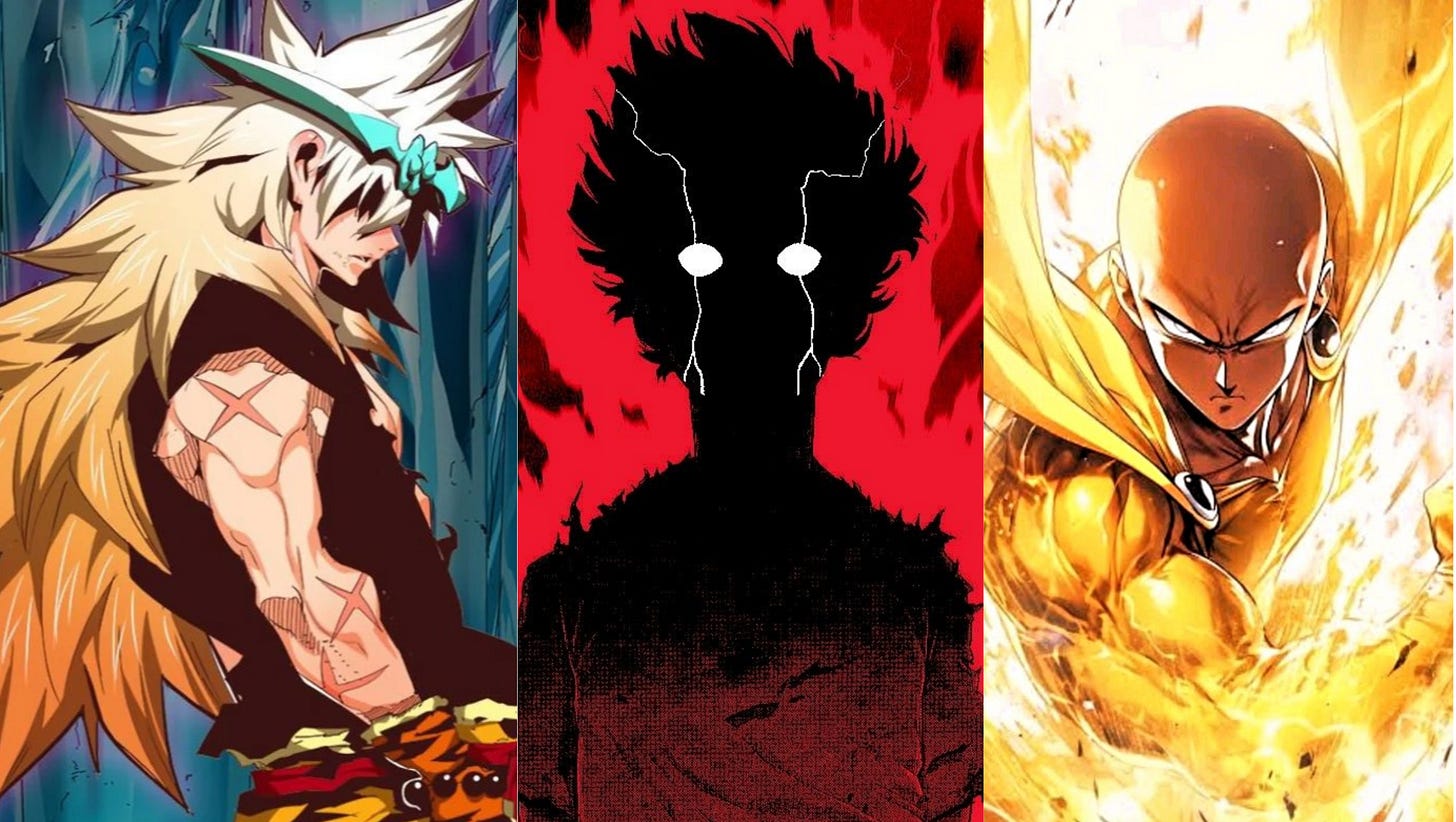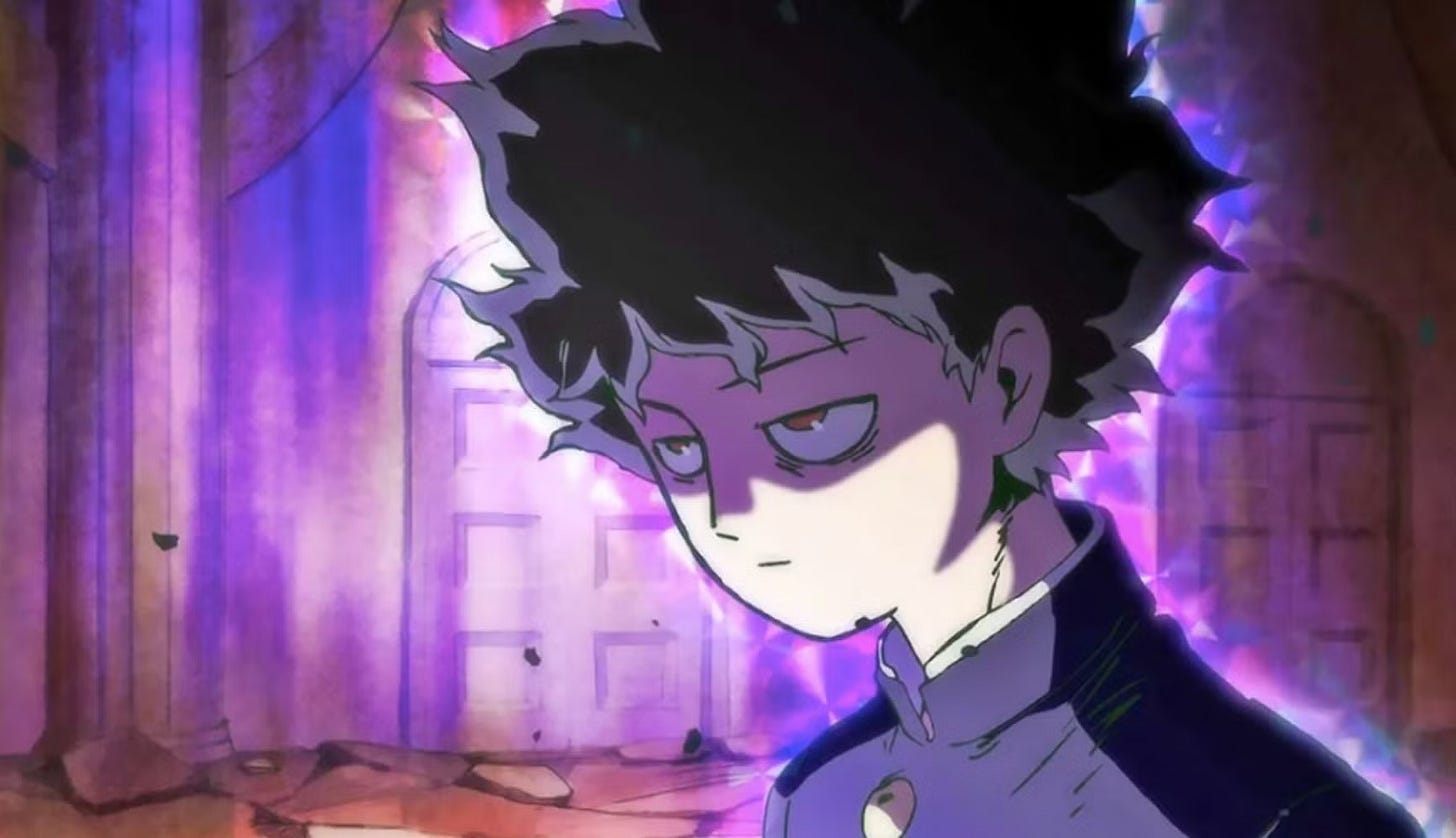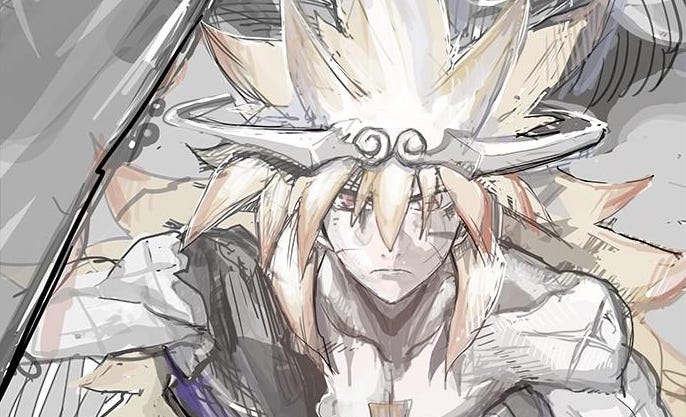Writing an overpowered protagonist is much harder than it seems on the surface. When your protagonist is so much more powerful than any threat he might face, how do you maintain the stakes? In something like an isekai anime or a regression manhwa, this is a feature rather than a bug: the protagonist serves as a means of wish fulfillment, where an ordinary person transforms into a flawless, godlike being who effortlessly defeats every opponent and seduces every girl. But what if you want to write something more complex? I’ve talked about powerful side characters, but when a protagonist — the character who drives the plot forward — is so much more powerful than everyone else in the story, having meaningful stakes becomes an even bigger problem.
The Unbeatable Character
There’s a popular saying: power corrupts, and absolute power corrupts absolutely. But what if power doesn’t corrupt? What if it reveals? When someone has the power to do whatever they want, you find out exactly what it is that they truly want to do. So what does that say about them as a person?
In this post, I’ll be looking at three different main characters to analyze how they break the mold of generic overpowered protagonists.
Note: This post contains spoilers for One-Punch Man, Mob Psycho 100, and The God of High School.
Saitama (One-Punch Man)
One-Punch Man was created as a parody of the superhero genre. Rather than deriving its conflict from an epic clash between heroes and villains, it’s a lighthearted comedy that pokes fun at the tropes of both superhero comics and shonen manga while still having some heartfelt moments. As the title suggests, the story focuses on the daily life of a hero so powerful that he kills every villain he fights in one punch.
The Hero Association in One-Punch Man is less like the Avengers or the Justice League and more like an average corporate workplace, complete with office politics, bosses who are incompetent or on power trips, and a ranking system based on external features like good looks and popularity rather than actual strength. Saitama, despite being massively more powerful than every hero in the system, is a low-ranked hero without the wealth or fame of one higher in the ranks.
In most stories, an overpowered hero risks killing tension because every problem has an obvious solution: the hero wins. With Saitama, however, the fights aren’t actually the central conflict. The real stakes are emotional and existential. Saitama’s incredible power leaves him with a sense of ennui and disappointment towards his superhero life.
Saitama becomes a thrill-seeker, searching over and over for an enemy that he can go all-out against. He never finds it: monster kings, alien conquerors, and literal apostles of God all lose to him quickly. Without any force capable of challenging him, his rigorous training ultimately feels pointless. The story asks the question: does overwhelming power even mean anything if you aren’t able to use it?
Saitama is far from the Gary Sue that is the typical isekai or manhwa protagonist. Gaining powers doesn’t magically make him handsome, rich, or popular with women. It doesn’t magically fix everything wrong in his life. In fact, in every aspect of his life not related to his powers, Saitama is overwhelmingly average to the point that people question why the likes of Genos and Bang hang out with him. This makes him easy for readers to like: a protagonist who worries about rent, tricks his friends into treating him to dinner, and runs around chasing supermarket discounts is much more relatable than one who lives in a mansion and dates supermodels.
In recent years, the manga has been leaning heavily into the action aspect of the series rather than comedy. I’m not a fan of this approach; it feels like the series has slowly become one of the superhero/shonen manga it once parodied. At its core, One-Punch Man is a story about enjoying the simple pleasures of everyday life, whether it be hanging out with your friends or getting groceries at a discount or playing video games. The epic battles of heroes against villains seem almost irrelevant in comparison.
Shigeo Kageyama (Mob Psycho 100)
Mob Psycho 100 focuses on Shigeo ‘Mob’ Kageyama, a middle-school student with incredibly powerful psychic abilities. Besides his powers, everything about Mob is incredibly average: he’s that one kid who blends into the background, the one who’s chosen last at PE. Still, out of all the espers in his world, he is easily the most powerful. The writer even gives us a clear way to measure his power, with a percentage labeled "Shigeo's Progress Towards Explosion". When the meter reaches 100, he goes all out in a metaphorical (and sometimes literal) explosion of psychic power.
Still, Mob’s powers are not the point. While he was created by the same author as Saitama, they have one key difference: his story isn’t based on his powers, but on his personal growth.
When Mob is introduced, he is awkward, reserved, and deeply self-conscious. His psychic abilities, while awe-inspiring to others, are something he treats almost like a dangerous burden. As a child, an incident where his powers hurt his younger brother led him to believe that strong emotions could trigger catastrophic destruction. This fear pushed him to suppress his feelings, creating a habit of emotional detachment. Mob thus begins the story not as a confident powerhouse, but as a boy afraid of himself.
In a battle, the outcome is almost certain: Mob wins. The suspense lies in how far he’ll go, what collateral damage will occur, and whether he’ll stay true to himself. This keeps the audience invested without relying on fake tension or “maybe he’ll lose this time” tricks.
Mob struggles not to let his powers define him. We see that by abusing his psychic abilities, he could have everything he wants: looks, popularity, physical fitness. Despite this, he chooses not to. We see why in his speech against Teruki, another esper.
Now I understand why you hate me. It’s because you hate yourself. You’re just like me — not because of your powers, but because you don’t have any confidence in yourself. If you take away your powers, there’s nothing left. You’re completely empty. You’re just afraid of recognizing that, and that’s why you want to kill me. I don’t stand out. I don’t leave an impression on people. I don’t have many friends. At most, I catch the eye of some ghosts. I’m just a background character. And the truth is, you’re just like I am. I think you don’t want to acknowledge that without your powers, you can’t do anything.
Mob’s goals aren’t the grand dreams of someone like Naruto or Luffy, but are smaller and more personally relatable. He genuinely believes that his powers don’t make him better than anyone else. What use is being able to flatten a city when you can’t do your homework, or run a lap, or talk to girls? He tries very hard to improve himself, not relying on his powers to make his progress easier.
Unlike many overpowered protagonists, Mob has his own set of flaws. He’s awkward, quiet, and bad at reading social cues. He initially suppresses his emotions to avoid losing control, which stunts his emotional growth. He lets people manipulate him because he wants to be liked and avoids conflict outside of psychic battles.
Across the three seasons, Mob’s arc is not about escalating strength but integrating his psychic powers into a healthy self-image. In Season 1, he learns that psychic abilities don’t make him superior; in Season 2, he learns to stand by his values and express his emotions; in Season 3, he fully accepts every part of himself, uniting his calm demeanor with the destructive force of his power. By the end, Mob’s greatest victory isn’t defeating an enemy—it’s achieving emotional maturity.
Mob is the opposite of a hollow power fantasy. His overwhelming strength isn’t wish fulfillment — it’s a burden that forces him to confront themes of identity, responsibility, and emotional growth. Mob’s psychic abilities are the least interesting thing about him, which is exactly why they stay interesting.
Jin Mori (The God of High School)
Unlike my previous two examples, The God of High School is closer to a traditional battle shonen, clearly drawing inspiration from Dragon Ball and Naruto. Jin Mori is a talented young martial artist, later revealed to be the reincarnation of the Chinese deity Sun Wukong. While The God of High School anime has its criticisms, Mori himself works as a compelling overpowered protagonist because the story treats his strength as part of a larger personal journey rather than an instant win button.
From the start, Mori is immensely talented in martial arts, even before his divine heritage is revealed. However, his characterization centers on his infectious optimism, loyalty to friends, and love for martial arts itself, not simply the fact that he can overpower opponents. His early fights show that he’s not invincible — he still takes hits, makes mistakes, and sometimes loses due to underestimating others. When his identity as Sun Wukong is unveiled, he still struggles with the limitations caused by his amnesia and missing weapons.
When he finally regains his full power, Mori summarily wipes the floor with multiple pantheons of gods and stops a world-ending cataclysm nearly single-handedly. In most stories, this would be the final battle. In The God of High School, however, it’s just the midpoint. The writer then makes the bold move of stripping away his powers.
If someone defines themselves by their power, who are they without it? Mori is forced to grapple with this question. The threats he faces haven’t reduced; in fact, in order to save his sister, he needs to infiltrate the enemy stronghold. His loss of power forces him to make decisions and compromises he never would have made before, and these decisions allow him to grow as a character. Losing his strength forces him to work on his other skills; to use sheer hard work to compensate for the loss of the natural talent that he once possessed. We see this in a conversation with one of his opponents.
Samuel: A month ago, you had to transform into your original form just to fight us… did you improve so much that you don’t need to now? How is the gap between us so wide?
Mori: If I still had all my power, I could kill you by sneezing. I was always strong. Don’t talk about how it’s unfair or all that crap. Do you know how unfair it is for me that I got weaker? I got this far through practice alone. You don’t know how many times I almost died just to get this far. You don’t have any right to talk about talent or how unfair it is.
Mori’s growth as a character is rooted in his gradual realization that his worth is not solely defined by his overwhelming power or his ability to protect and save others. As he faces increasingly difficult battles and personal trials, Mori begins to confront his own flaws, vulnerabilities, and fears. These challenges force him to reflect on what truly matters and to understand that relying on others is not a weakness but a strength in itself. Over time, he learns to trust his friends, to seek their help when needed, and to accept support without shame. This shift marks a profound change in Mori’s character, transforming him from a solitary god into someone who values teamwork, connection, and mutual care.
As Mori’s journey progresses, his opponents grow in power much faster than he does, forcing him into increasingly desperate and punishing battles. Each confrontation wears him down and injures him further. By the time he reaches the final battle, Mori is a shadow of his former self. The only reason he is still standing is the arsenal of skills and techniques he has painstakingly acquired. These abilities feel earned, each one born from pain and near-defeat.
This makes the moment he regains his full power — and even pushes beyond it — all the more electrifying. It is not an effortless awakening, nor the casual dominance we often see in overpowered protagonists. Instead, it feels like the culmination of every hardship and sacrifice he has been forced to make. Watching him rise from the brink is cathartic precisely because we know what it cost him. In a way, Mori’s arc is the inverse of the typical isekai protagonist. Here, we witness the blood, sweat, and agony behind the strength. We have seen him struggle, break down, and rebuild himself. So when he finally ascends to an overpowered state, it doesn’t feel cheap — it feels earned.
Conclusion
An overpowered side character — like Gojo from JJK or Takamura from Sakamoto Days — is fun to read. An overpowered protagonist, on the other hand, is a lot harder to get right. The protagonist is the one who traditionally solves the central conflict of the plot. But if he is massively more powerful than everyone else around him, if he can win against any opponent with minimal effort, it can remove tension. The series I analyzed in this post avoid this problem through various different methods. Saitama from One-Punch Man is a gag character whose overpowered nature is played for laughs and pokes fun at the tropeyness of his world and genre, while also meditating on the dissatisfaction overwhelming power might foster. Mob from Mob Psycho 100 grapples with the responsibilities that come with his power and focuses on his personal growth rather than his psychic abilities. Mori from The God of High School loses his powers, but learns to fight without them and stops defining himself by his ability to protect people. Each of these characters shows how an overpowered protagonist need not feel boring or one-note.







